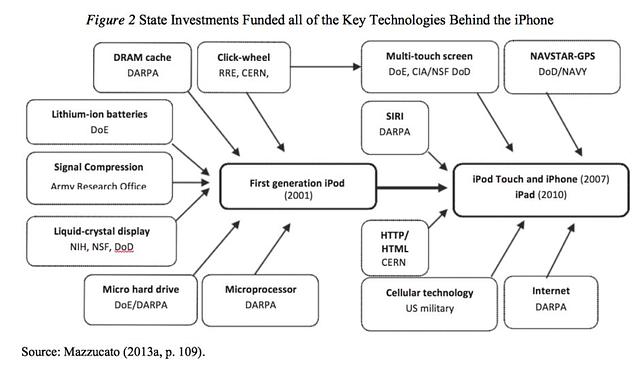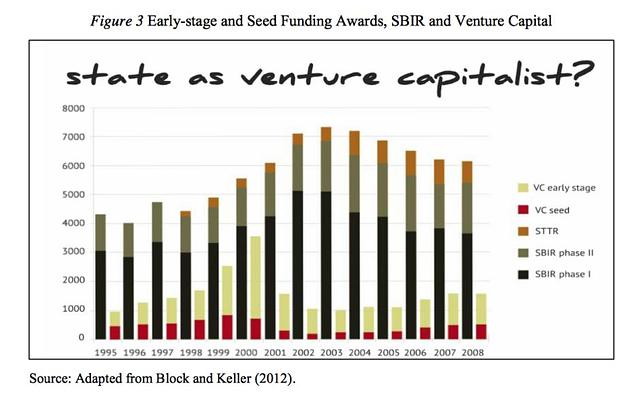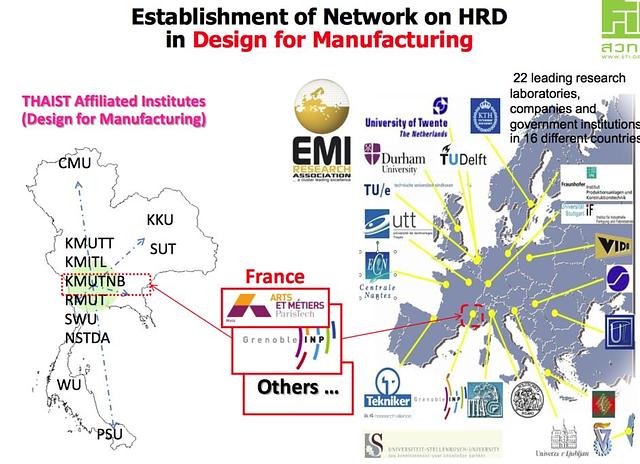Critics on Mariana Mazzucato's "Entrepreneurial State"
State Investments Funded all of the Key Technologies Behind the iPhone
Early stage and seed funding awards, SBIR and venture capital
http://www.levyinstitute.org/pubs/wp_824.pdf
Organizational structure of STI system of policy in Thailand
http://eeas.europa.eu/delegations/thailand/documen...
(1) What Mazzucato has done here is morph the work “public good” from its technical meaning over into something much closer to “public service”, or “goods provided publicly” both of which are very different concepts from the first. And this matters: for there are indeed, as above, very good arguments why there should be governmental support for public goods in that technical sense. But to use those arguments to support public provision of private goods is a very naughty little logical trick indeed. http://www.forbes.com/sites/timworstall/2013/12/15...
(2) The heart of Mazzucato’s work lies in the fourth and fifth chapters of her book, devoted respectively to “The U.S. Entrepreneurial State” and to “The State Behind the iPhone.” To properly assess Mazzucato’s work, one must confront the examples she provides in those chapters. http://object.cato.org/sites/cato.org/files/serial...
(3) But the book’s most novel and prominent policy proposal seems more problematic. This is the idea that the state should be entrepreneurial by participating in the upside of its innovation funding.
The point of this recommendation is to change the balance of risks and rewards the state faces when it comes to innovation: “reward the wins when they happen so that the returns can cover the losses from the inevitable failures”. Mazzucato suggests three ways of doing this: “golden shares of IPR and a national innovation fund”, “income-contingent loans and equity” and “development banks”.
I’ve explained before that this has several problems. It’s difficult to administer in practice (there are lots of opportunities for avoidance, and which innovation policies count? Research grants? Procurement?). It’s a tough political sell: the government would effectively be charging a special levy on companies that make use of government research, which are generally the ones that invest more in innovation themselves. You can see how ARM, Rolls Royce or GSK would lobby against such a policy, and why it would be hard to spin it as a policy to support innovative enterprise. And it’s not how most of the successful entrepreneurial state activity described in the book actually took place. It’s notable that technology funding in the countries with the most entrepreneurial states, such as Finland, Israel or the United States, generally make unrestricted grants, and where they seek a return, this is generally capped at the original level of the grant – the state can get its money back with interest, but not an equity share. https://www.theguardian.com/science/political-scie...
(4) Ms Mazzucato says that the most successful entrepreneurial state can be found in the most unlikely place: the United States. Americans have traditionally been divided between Jeffersonians (who think that he governs best who governs least) and Hamiltonians (who favour active government). The secret of the country’s success lies, she thinks, in talking like Jeffersonians but acting like Hamiltonians. Whatever their rhetoric, governments have always invested heavily in promoting the spread of existing technologies such as the railways (by giving the rail barons free land) and in seeking potentially lucrative scientific breakthroughs (by financing almost 60% of basic research).
Quibbles aside, Ms Mazzucato is right to argue that the state has played a central role in producing game-changing breakthroughs, and that its contribution to the success of technology-based businesses should not be underestimated. She is also right to point out that the “profligate” countries that are suffering the most from the current crisis (such as Greece and Italy) are those that have spent the least on R&D and education. There are many reasons why policymakers must modernise the state and bring entitlements under control. But one of the most important is that a well-run state is a vital part of a successful innovation system. http://www.economist.com/news/business/21584307-ne...
ความเห็น (0)
ไม่มีความเห็น



